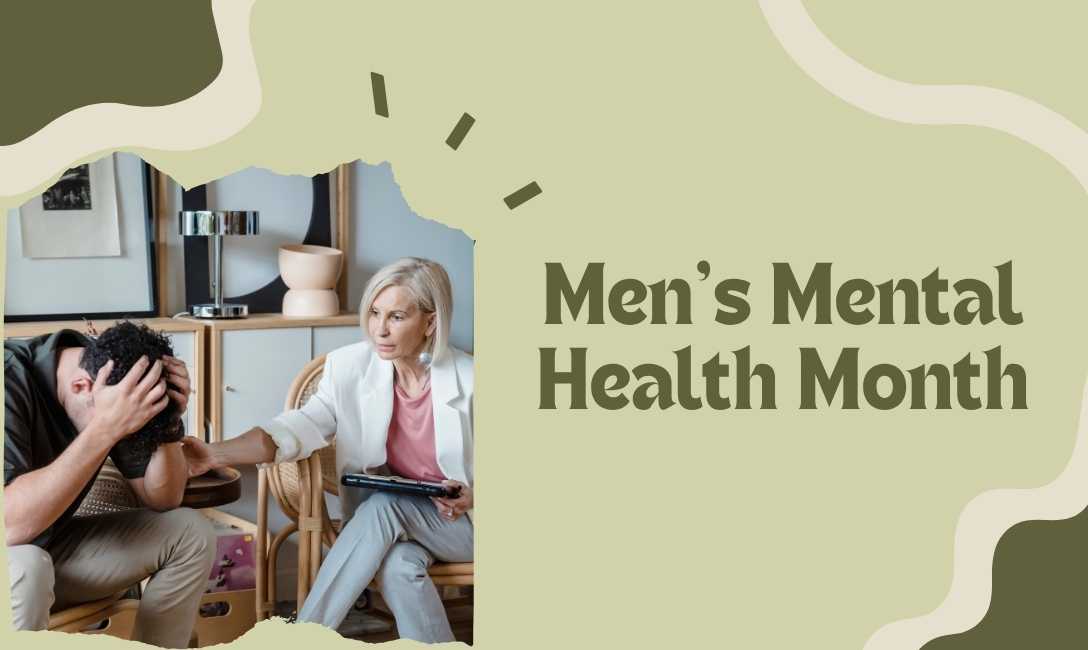Introduction: A Silent Crisis
Every June, Men’s Mental Health Month is observed globally to raise awareness about mental health challenges specifically affecting men. Yet, despite increased recognition, this month often passes quietly compared to other health campaigns. Mental health remains a taboo subject for many men, leading to unspoken battles with depression, anxiety, addiction, and even suicide.
The statistics are alarming: According to the World Health Organization (WHO), men die by suicide at a much higher rate than women. Many suffer in silence due to stigma, cultural expectations, and lack of emotional support. This article explores why Men’s Mental Health Month is crucial, why it tends to be ignored, and what actionable steps men can take toward better mental wellness.
When is Men’s Mental Health Month Celebrated?
Men’s Mental Health Month is observed every year in June. It’s a dedicated time to highlight the mental health issues men face and to promote open conversations around topics often shrouded in stigma, like depression, anxiety, PTSD, and suicide among men. While the entire month of June focuses broadly on men’s health (including physical and emotional wellness), mental health awareness plays a key role during this time.
In some regions, the week surrounding Father’s Day (the third Sunday in June) is also marked as Men’s Health Week, further emphasizing the importance of both physical and mental well-being for fathers, sons, brothers, and all men.
By spotlighting these efforts in June, organizations and individuals are encouraged to educate, share resources, and dismantle the cultural silence around men’s mental wellness.
Why Is Men’s Mental Health Month Often Ignored?
While awareness of mental health is growing, Men’s Mental Health Month still doesn’t receive the same level of public engagement as other health initiatives. There are several reasons for this:
- Cultural Stigma: Many societies view emotional vulnerability in men as a weakness. Phrases like “man up” or “boys don’t cry” discourage men from seeking help.
- Underrepresentation in Media: Mental health campaigns often lack male voices and stories, making it difficult for men to relate or feel represented.
- Misunderstood Masculinity: Traditional masculinity ideals promote stoicism, self-reliance, and toughness, which conflict with seeking emotional support.
- Lack of Resources: Many programs and mental health services are not tailored to men’s unique needs, which can discourage them from participating.
The Importance of Men’s Mental Health Month
Men’s Mental Health Month isn’t just another awareness campaign—it’s a movement to break generational silence and save lives. Here’s why it matters:
- High Suicide Rates: Men are nearly 4 times more likely to die by suicide than women.
- Substance Abuse: Men are more likely to use and misuse alcohol and drugs as coping mechanisms.
- Undiagnosed Disorders: Depression, PTSD, and anxiety often go unnoticed in men due to misinterpreted symptoms (e.g., anger, irritability).
- Work and Family Pressures: Societal expectations to be providers and protectors create immense stress.
- Lack of Help-Seeking Behavior: Men are less likely to speak to therapists, doctors, or even friends about emotional issues.
10 Major Tips for Supporting Men’s Mental Health
Here are ten essential tips for men (and their loved ones) to prioritize mental well-being:
- Talk About It
The first step is acknowledging that it’s okay to not be okay. Whether it’s with a friend, family member, or therapist, expressing emotions helps release stress and build connection.
- Exercise Regularly
Physical activity releases endorphins that naturally boost mood and decrease symptoms of depression and anxiety.
- Seek Professional Help
Therapists and counselors offer a safe space to explore emotional issues. Men must understand that therapy is a strength, not a weakness.
- Limit Alcohol and Substance Use
Avoid using alcohol or drugs as emotional crutches. They worsen mental health issues and delay healing.
- Prioritize Sleep
Poor sleep is linked to several mental health disorders. Aim for 7–9 hours of restful sleep every night.
- Build Strong Relationships
Nurture relationships with people who offer emotional support and are willing to listen without judgment.
- Practice Mindfulness and Meditation
Mindfulness practices like deep breathing, yoga, or meditation help calm the mind and manage stress effectively.
- Engage in Hobbies
Find time for creative or relaxing activities—whether it’s painting, music, reading, or gaming—to keep the mind stimulated and joyful.
- Challenge Gender Norms
Question outdated ideas that discourage vulnerability in men. True strength lies in authenticity and emotional honesty.
- Be a Role Model
If you’re comfortable, share your mental health journey. It can empower other men to open up and seek help without shame.
Conclusion: Let’s Change the Narrative
Men’s Mental Health Month is a critical reminder that mental wellness is not gendered. The time has come to challenge harmful stereotypes and empower men to speak up, seek help, and heal. Silence and suppression only deepen wounds. By promoting open conversations, investing in male-friendly mental health services, and raising awareness, we can build a society where men feel seen, heard, and supported.
Mental health should never be a silent struggle. Let this month be a starting point for lifelong conversations.
Frequently Asked Questions (FAQs)
- What is Men’s Mental Health Month?
Men’s Mental Health Month, observed in June, focuses on raising awareness of mental health challenges that uniquely impact men and promoting better mental wellness through education and support. - Why don’t men talk about their mental health?
Due to societal pressure, stigma, and fear of appearing weak, many men avoid discussing emotions or seeking help. Cultural norms often discourage emotional vulnerability in males. - What common mental health issues?
Depression, anxiety, substance abuse, PTSD, and suicidal thoughts are among the most common. However, men may express these differently—through anger, aggression, or isolation. - Are there mental health resources specifically for men?
Yes. Organizations like HeadsUpGuys, Movember, and Mental Health America offer male-focused resources. Many therapists also specialize in men’s mental health issues. - How can I support a man struggling with mental health?
Be present, listen without judgment, and encourage them to seek professional help. Normalize conversations around emotions and avoid toxic phrases like “man up.” - Can men benefit from therapy as much as women?
Absolutely. Therapy provides tools to cope with stress, navigate emotional difficulties, and improve quality of life, regardless of gender. - How can workplaces support men’s mental health?
Employers can offer Employee Assistance Programs (EAPs), foster open mental health discussions, and provide flexible work environments to reduce stress.




